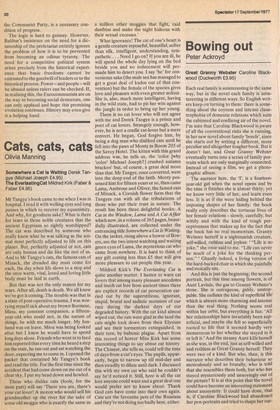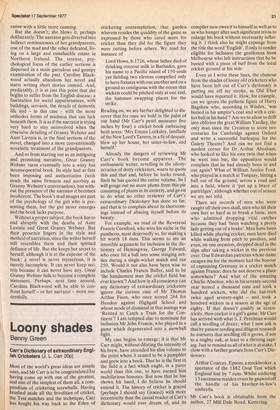Bowing out
Peter Ackroyd
Great Granny Webster Caroline Blackwood (Duckworth £3.95) Each real family is uninteresting in the same way, but in the novel each family is, uninteresting in different ways. So English writers keep on turning to them: there is something about the coyness and intense claustrophobia of domestic relations which suits the cabinned and confining air of the novel. I'm sure that Caroline Blackwood is.aware of all the conventional risks she is running, in her new novel about family 'bonds', since she starts out by writing a different, more peculiar and altogether tougher book. But it doesn't last, and Great Granny Webster eventually turns into a series of family portraits which are only marginally connected. Instead of seeing a film, we get a photographic album.
The narrator here, the 'I', is a fourteenyear-old girl when the novel opens and by the time it finishes she is almost thirty; yet we know very little of her, and learn even less. It is as if she were hiding behind the imposing shapes of her family: the book really only describes the tortuous lives of her female relations — slowly, carefully, but wittily and with the kind of tough perceptiveness that makes up for the fact that the book has no real momentum. Granny Webster herself is a nightmarish creature, self-willed, ruthless and joyless: "Life is no joke," she once said to me. "Life can never be much of a joke for the thinking person."' Ghastly indeed, a living version of the hard-backed chair in which she painfully and stoically sits.
And this is just the beginning; the second, portrait, but this time among flowers, is of Aunt Lavinia, the gas to Granny.Webster's stone. She is outrageous, giddy, unstoppable. She radiates the kind of superficial life' which is always more charming and intense than the real thing. Nothing seems real within her orbit, but everything is fun: 'All her relationships have invariably been superficial, and maybe she felt so superficially rooted to life that it seemed hardly very momentous to her whether she stayed in it or left it.' And the steamy Aunt kills herself as she was, in the end, just as self-willed and and ruthless as Great Granny herself. They were two of a kind. But who, then, is this narrator who describes their behaviour so meticulously and so brutally, who is told that she resembles them both, but who has stayed mysteriously and annoyingly out of the picture? It is at this point that the novel could have become an interesting statement about anonymity. It could have done, that is, if Caroline Blackwood had abandoned her pen-portraits and tried to shape her nar rative with a little more cunning. But she doesn't; she blows it, perhaps deliberately. The narrator gets diverted into indirect reminscences of her grandparents, one of the mad and the other defeated, living on a large and ramshackle estate in Northern Ireland. The intense, psychological focus of the earlier sections is dispersed in a more garrulous and gossipy examination of the past. Caroline Blackwood actually abandons her novel and starts writing short stories instead. And, predictably, it is at just this point that she begins to suffer from the English disease: a fascination for social appurtenances, with buildings, servants, the details of domestic life and — in this case — with the more orthodox forms of madness that can lurk beneath them. It is as if the narrator is trying very hard to stay uninvolved when the obsessive detailing of Granny Webster and Aunt Lavinia is, in the final sections of the novel, changed into a more conventionally novelistic treatment of the grandparents.
And so from starting out as an intriguing and promising narrative, Great Granny Webster turns eventually into a witty but inconsequential book. Its style had at first been imposing and authoritative (with much the same firmness and acerbity as Granny Webster's conversation), but without the presence of the narrator it becomes incoherent. The book's mad images are part of the psychology of the girl whb is presenting them, but the girl never emerges and the book lacks purpose.
Without a proper subject, the book has to end abruptly with the deaths of Aunt Lavinia and Great Granny Webster. But their presence lingers in the style and method of narration, since the writer herself still resembles them and their spirited defiance of life. But she keeps her secret to herself, although it is at the expense of the book: a novel is never mysterious, it is merely incomplete. It can never keep secrets because it can never have any. Great Granny Webster fails to become a complete statement. Perhaps, next time around, Caroline Blackwood will be able to confront herself — or her narrator — more successfully.































 Previous page
Previous page